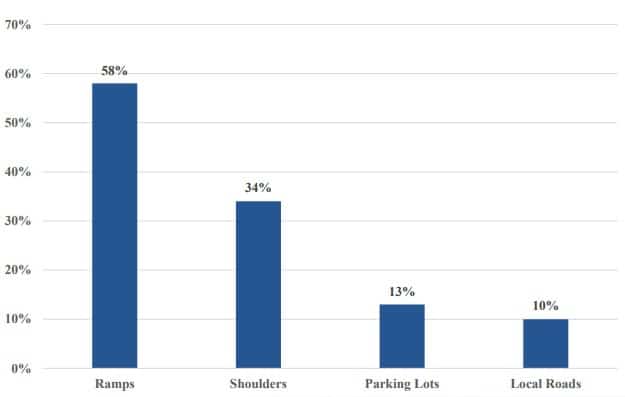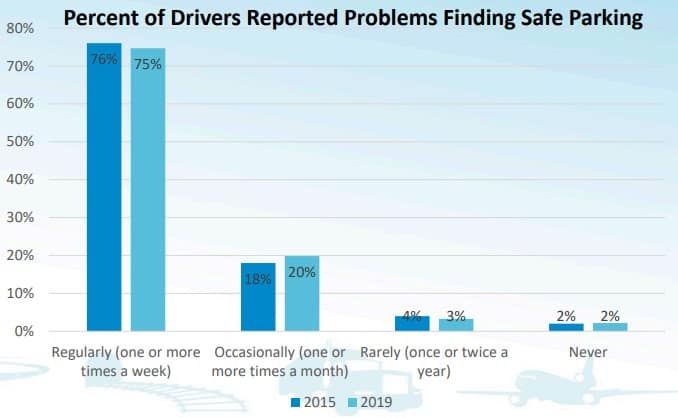When TravelCenters of America [NASDAQ: TA] announced in May 2020 that it had signed a franchise agreement to build a Petro Stopping Center in Monteagle, Tennessee, the company and franchisees Brian Graber, Tammy Graber and Rodney Kilgore expected to be opening its doors in the first quarter of this year.
But a small group of “not in my backyard” (NIMBY) activists took up an opposition campaign last summer that threatened to cancel the project – along with desperately needed new safe parking for big rigs.
“We were getting ready to submit our site plan to the town council in July to get their stamp of approval and all of sudden there was pushback from five or six neighbors,” Brian Graber told FreightWaves. “We thought it was going to be a slam dunk from the beginning, but it became a big political fight that spiraled out of control. It was sort of eye-opening.”
Public vs. private
The effort to expand truck parking in the U.S. is usually couched as a battle over priorities for public financing, not a fight within a local community. Awareness of the truck parking shortage was heightened in 2009 when trucker Jason Rivenburg was murdered while sleeping in his cab at an abandoned gas station after being unable to find safe parking.
The tragedy led to the passing of Jason’s Law in 2012, which required the Federal Highway Administration (FHWA) to conduct surveys evaluating the ability of states to provide adequate public parking and rest facilities for commercial drivers. Surveys released by FHWA in 2015 and 2020 found the shortage growing worse.

But while increasing truck parking capacity in rest areas is eligible for federal funding, investing in new truck spaces and facilities competes with other priorities such as bridge and road maintenance, leaving much of the truck parking capacity to be provided by commercial truck stops – such as TravelCenters of America – near major highways and interstates. The 2020 Jason’s Law survey found that of the approximately 313,000 truck parking spaces tallied nationally, 273,000 – 87% – were located at private truck stops.
Filling a gap
Graber does not have a trucking background himself, but he knows enough about the industry through relatives and his wife’s family to know that a dearth of truck parking is a top industry concern and in Monteagle specifically.
Located about 50 miles west of Chattanooga in the southeastern part of the state, Interstate 24 cuts through the town of about 2,000 residents. The 20 acres of land on which the Petro outlet will be built is just off the interstate and yards away from what will be a competing Pilot Travel Center. But Pilot’s 88 truck spaces are not enough, Graber said.
“This location is a hotbed – it sits on a mountain and is a natural stopping point for trucks. There are always trucks parked along the entrance and exit ramps. Building here is a no-brainer.”

The Owner-Operator Independent Drivers Association (OOIDA) has been a major player in attempting to fill the investment gap for truck parking capacity by pushing legislation that would set aside hundreds of millions of dollars from U.S. Department of Transportation funds to create more spots.
“It’s not just in Tennessee, the NIMBY issue is a problem for truck parking in a lot of places,” OOIDA Executive Vice President Lewie Pugh told FreightWaves. “Our hope is that we can get the public money in place even though local citizens may fight against it.”
Community concern
Despite the prospect of providing 130 new jobs in a town and county where new sources of revenue were in demand, opposition to Graber’s plan escalated quickly. A GoFundMe page raised $8,300 toward legal fees fighting the project, and a petition with over 200 signers was posted online in an attempt to “Stop the Truck Stop.”
Among the concerns: “I shudder to think what the far-reaching impact will be on our cherished mountaintop community, both environmentally and socially,” wrote one petition signer. “My greatest concern is the sex trafficking which is abundant at truck stops. This will add to the already drug-plagued concerns of the county.”
Building another truck stop in Monteagle “would irrevocably change the character of our cherished little historical town,” posted another. “Monteagle needs jobs, but we can do much better than a noisy, dangerous, highly polluting truck stop.” And another simply wrote: “Not in our backyard!”
One of the town’s planning commissioners believed she was taking a more pragmatic approach. In an opinion column published in the local newspaper in March, Iva Michelle Russell, recently appointed to the commission, explained why she was one of the unanimous votes to recommend approval of rezoning the site for the franchise.
“I get it. I have read all the arguments. I understand tourism and the ‘big picture,’” Russell wrote. “But I also understand the realities of fiscal responsibility in government operations. Unfortunately, towns do not operate on unicorns and sunshine, especially Monteagle. We are uniquely blessed with two exits. That is where our revenue comes from, and with that revenue comes the opportunity to pave roads, repair infrastructure, beautify the town and create long-lasting recreational opportunities for our youth.”
Moving forward
The commission is expected to take a customary second vote in the coming week before signing off on the site plan. The goal is to break ground on June 1, in anticipation of a Jan. 1, 2022, opening.
The main building will be 24,000 square feet, which is double the size of the average travel center, Garber said. Restaurants planned for the travel center include Papa John’s, Bojangles and Betty’s Kitchen. Planned amenities include a barbershop, fitness center, drivers’ lounge, laundry facilities and potentially a pharmacy.
“We want drivers to be able to stay overnight, relax and have a great meal at a family-owned restaurant,” Graber said. “Drivers will be welcomed here with open arms and will be appreciated.”
Related articles:

Robert Haenggi
Let them eat Tall Fescue.
Robert Haenggi
Let them eat weeds.
Susie Lipscomb
No one opposed to this development opposes truckers or trucking. The proposed site is 80 feet from an existing neighborhood, across the street from the town’s little league ballpark and atop a major aquifer. If it was relocated 2-3 miles from homes, parks, schools etc there would be no problem.
Robert Haenggi
Let them eat Tall Fescue.
Desiree Ann Wood
Thank you for posting this comment. I am a truck driver and a truck parking advocate. I have worked with Hope Rivenburg on Jason’s Law since shortly after her husband’s murder. I feel like what is often missed is planners and corporate interests don’t communicate well with the community to find a spot that serves the community, brings jobs but also serves the truck drivers.
I know I prefer parking somewhere I can turn off my engine and see the landscape through my window and know I am parked safe for the night.
Do you think there is a way to negotiate through this? I’ve driven through your area many times and there is certainly a need. I just feel like the approch with community is lacking and this hurts truck drivers who just need a place to park safe and sleep for 10 hours.
Desiree Wood
President
REAL Women in Trucking Association/Actual Truck Driver
Estelle Johnson
I love REAL Women in Trucking! Women can get things done! Just to add to what someone else wrote about Monteagle: It is a really small town with lots of history and natural beauty. Most people just know it as the top of the climb before the descent on I-24 and have no idea about the beautiful waterfalls and large tracts of virgin forest or its unique bio-diversity prized by conservationists everywhere. It was started in the 1800’s. Back then there was an old stage coach road and later the Mountain Goat train brought people and goods here. Because of its location atop a really narrow strip of plateau only a couple of miles wide everything “town” is close to I-24, squeezed between two exits. The integrity of Monteagle needs to be protected from a large 22-acre overnight truck parking facility in this particular location which is just way too close to town center. This is not your typical NIMBY, far from it. There are so many homes, not to mention parks, library, school, retreat center, and important historical landmarks…all within a few hundred yards, way too close to this proposed site. My research shows me that truck plazas are not put on top of existing neighborhoods or elementary schools, ball parks or pedestrian pathways. Monteagle is also the Gateway to the South Cumberland Park Recreation Area and its real economy is driven by vacationers and ecotourism without which Monteagle would be a ghost town. The locally-owned businesses need to be protected also. There are way more jobs posted than those folks can fill and truck stop restaurants, for one, will compete head on with people whose livelihoods are dependent on the number of people they can serve. I don’t know anyone who doesn’t understand the pressures on truck drivers and the need for more locations for their health and safety. Monteagle, as you know, has a Pilot right off exit 135, more removed from town, for about 90 trucks. There’s also a Love’s at exit 158, 23 miles away, and a new Love’s at exit 117 just 18 miles away. That seems like a fair number of stopping places within 40 miles of one another. It’s not 5 or 6 neighbors in opposition as the developers would have you think. It’s more like 200 – 300 who have expressed opposition, signed petitions, and who believe the developers picked the wrong place without considering the proximity to homes, some as close as 60 feet. Monteagle has roughly 1200 citizens. It sits in three counties. Mostly Grundy and Marion with 65% living in Grundy and 35% in Marion. There’s a lot of pressure from one county, Marion, for the revenue a truck plaza would bring, but that county seat and most of its residents don’t live in Monteagle or even on the Plateau. Grundy County is constantly working on sustainable development that supports ecotourism which is the direction Monteagle needs to head for its own sustainable future. How can we who oppose a truck stop in this particular location support your work, your organization, and what you are trying to accomplish while protecting our town and its residents from what would truly devastate it and them? This conversation is so important. Thank you Desiree Ann Wood.